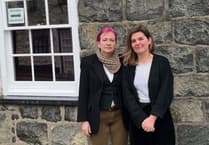More than one in 20 people in Gwynedd were providing unpaid care as of 2021, census data shows.
The latest figures from the 2021 census of England and Wales come as the leader of a care charity said the social care system would "collapse" without the work of unpaid carers.
Data from the Office for National Statistics shows 9,988 people in Gwynedd were looking after someone without being paid when the census was carried out in March 2021 – 8.9 per cent of the population over five years old in the area.
However, this was a fall from the previous census in 2011, when 10.9 per cent of people in the area were providing unpaid care.
Participants were asked whether the "look after, or give any help or support" to people with long-term physical or mental health conditions, or problems related to old age.
The rate also fell across England and Wales over the decade, from 11.4 per cent to 9 per cent – although the ONS warns that as the census was carried out during the pandemic, many people may have been avoiding seeing elderly or vulnerable friends and family.
The wording of the question on unpaid care was also different in the 2021 census, and the percentages used by the ONS have been standardised to account for differences in age between areas.
Carers UK said it was surprised that the overall figure had gone down, but added that many people may not self-report as a carer.
Helen Walker, chief executive of the charity, said: “Most people consider themselves to be a partner, husband, wife, son, daughter, good friend or neighbour and don’t recognise themselves as unpaid carers.
“We know that there are potentially many more hidden carers out there that could be getting information, advice and support and it’s essential that public services recognise this in their planning and delivery.”
In Gwynedd, 5,426 people were providing more than 20 hours of unpaid care a week in 2021 – including 3,514 people doing so for more than 50 hours a week.
Across the two countries, the proportion providing between 20 and 49 hours of care each week rose from 1.5 per cent to 1.9 per cent, while the proportion caring for more than 50 hours a week rose slightly from 2.7 per cent to 2.8 per cent.
Ms Walker said that without the work of unpaid carers, "our health and social care systems would quite simply collapse".
She continued: "It is vital that the government recognises the pressing needs of this huge swathe of people and develops a funded National Carers Strategy for England.”
A spokesperson for the Department for Health and Social Care said: “The government has prioritised health and social care in the Autumn Statement, with up to £7.5 billion available over the next two years to support adult social care services – the biggest funding increase in history.
“Specifically for unpaid carers, we are also providing local areas with over £290 million in funding for short breaks and respite services, as well as additional advice and support,” they added.




